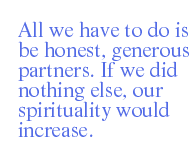
I think that the challenge to live with a body, with spirit and with a soul is universal every person and every community has to struggle with these three areas all the time. Christianity has often focused so narrowly on the spirit that the body has been neglected, even seen as an obstacle. But our modern culture has missed the mark, too. We have created a materialistic, technological wonderworld, but we have neglected to cultivate the spirit except in an ecclesiastical reaction against secularism. We haven't developed spirituality in the world of our everyday lives. We want computers in every school, but no one is raising a voice for beauty or compassion. We are worried that our children may not have the resources to live a comfortable life, but we don't concern ourselves much about their vision or their ethics their souls.
Most traditional societies have had a spiritual approach to government, but we try to do it with reasonableness and rationality. The recent public hearings on the Clinton scandal a mixture of moralism, sentimentality and ambition made it clear how weak and limited those resources are.
From our materialism we tend to think of sex as biological, and from our habits of thinking psychologically about ourselves we also think of it as a form of communication. But the religions of the world show that sex is deeper and greater in scope. As we work out our sexual lives, we are finding meaningful structures, values and purpose. I see sex fundamentally as the joy and challenge of being alive, full of desire, and moving ahead into the many possibilities we have in our short lives. Sex is vitality. If we have a good sexual experience, we may feel totally alive and inspired. Have a bad experience, and everything looks dull. Working our way through our sexuality is a path toward meaning and fulfillment in general.
It's in the nature of spirituality to seek purity and control and to live in hierarchies and with simple rules: Ten Commandments, Benedictine Rule, the Noble Eight-fold Path. If our spirituality, whatever its brand, doesn't have heart and soul, these tendencies will no longer serve positively but will become rigid. We see rigidity in Christianity, Islam, Judaism in all spiritual movements. In our religious rigidity we don't like the messiness of actual life and so always try to get it under control. Religion has a habit of reducing morality to the reining in of sex and then forgetting about other moral issues or making them secondary. No ones threatening to impeach the President for the use of violence to resolve conflicts or for supporting injustice.
Some religions do portray sex as a way to reach divinity. They recognize that our sexual desire is never fulfilled with a human partner, but that our interpersonal sex can be a way of opening up to a deeper and vaster kind of love and connection. I don't think we have to spiritualize our sexuality. All we have to do is be an honest, generous, present partner. If we did nothing else, our spiritual lives would increase.
Needless to say, there is no reason why anyone could not be a good Blakean Christian, simply choosing not to participate in the anti-sexual, anti-body anxiety of the church. There is nothing inherent in Christianity that is negative about sex. My favorite source of a pro-sexual view of Christianity is Oscar Wilde's wonderful letter from prison, De Profundis. In it he not only provides the outlines of a Blakean but also a Romantic Christianity. He moves Christianity from cool to warm, from anxious moralism to deep wisdom about passion, sin, and pleasure.
Francoeur responds and Moore adds more |
|


